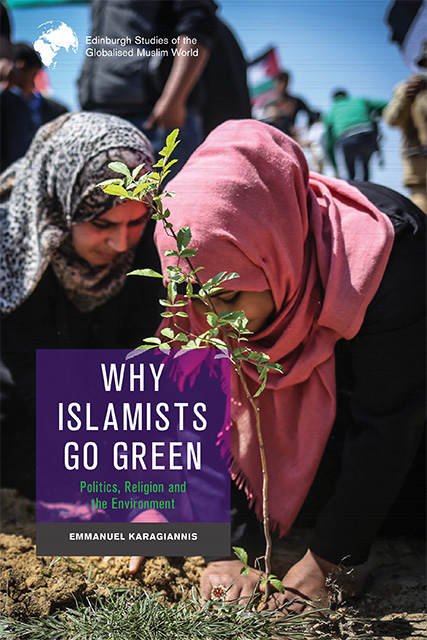Book contents
- Frontmatter
- Contents
- Glossary
- Transliteration
- Series Editor’s Foreword
- Preface and Acknowledgements
- Dedication
- Introduction
- 1 Islam and the Environment
- 2 The Muslim Brotherhood and the Environment
- 3 Hizb ut-Tahrir and the Environment
- 4 Hizbullah and the Environment
- 5 Hamas and the Environment
- 6 The Jihadi-Salafi Movement and the Environment
- 7 Understanding Islamist Environmentalism
- Conclusions
- Appendix
- Select Bibliography
- Index
Series Editor’s Foreword
Published online by Cambridge University Press: 20 October 2023
- Frontmatter
- Contents
- Glossary
- Transliteration
- Series Editor’s Foreword
- Preface and Acknowledgements
- Dedication
- Introduction
- 1 Islam and the Environment
- 2 The Muslim Brotherhood and the Environment
- 3 Hizb ut-Tahrir and the Environment
- 4 Hizbullah and the Environment
- 5 Hamas and the Environment
- 6 The Jihadi-Salafi Movement and the Environment
- 7 Understanding Islamist Environmentalism
- Conclusions
- Appendix
- Select Bibliography
- Index
Summary
Edinburgh Studies in the Globalised Muslim World is a series that focuses on the contemporary transformations of Muslim societies. Globalisation is meant, here, to say that although the Muslim world was always interacting with other societal, religious, imperial or national forces over the centuries, the evolution of these interconnections constantly reshapes Muslim societies. The second half of the twentieth century has been characterised by the increasing number and diversity of exchanges on a global scale bringing people and societies ‘closer’, for better and for worse. The beginning of the twenty-first century confirmed the increasingly glocalised nature of these interactions and the challenges and opportunities that they bring to existing institutional, social and cultural orders.
The series is not a statement that everything is different in today’s brave new world. Indeed, many ‘old’ ideas and practices still have much currency in the present, and undoubtedly will also have in the future. Rather, the series emphasises how our current globalised condition shapes and mediates how past worldviews and modes of being are transmitted between people and institutions. The contemporary Muslim world is not merely a reflection of past histories, but is also a living process of creating a new order on the basis of what people want, desire, fear and hope. This creative endeavour can transform existing relations for the better, for example by reconsidering the relations between society and the environment. It can equally fan violence and hatred as illustrated in the reignition of cycles of conflicts over sovereignties, ideologies or resources across the globe.
The Globalised Muslim World series arrives at a challenging time for any inquiry into Muslim societies. The new millennium began inauspiciously with a noticeable spike in transnational and international violence framed in ‘civilisational’ terms. A decade of ‘war of terror’ contributed to entrenching negative mutual perceptions across the globe while reinforcing essentialist views. The ensuing decade hardly improved the situation, with political and territorial conflicts multiplying in different parts of the Muslim world, and some of the most violent groups laid claim to the idea of a global caliphate to justify themselves. Yet, a focus on trajectories of violence gives a distorted picture of the evolution of Muslim societies and their relations with the rest of the world.
- Type
- Chapter
- Information
- Why Islamists Go GreenPolitics, Religion and the Environment, pp. x - xiiPublisher: Edinburgh University PressPrint publication year: 2023

